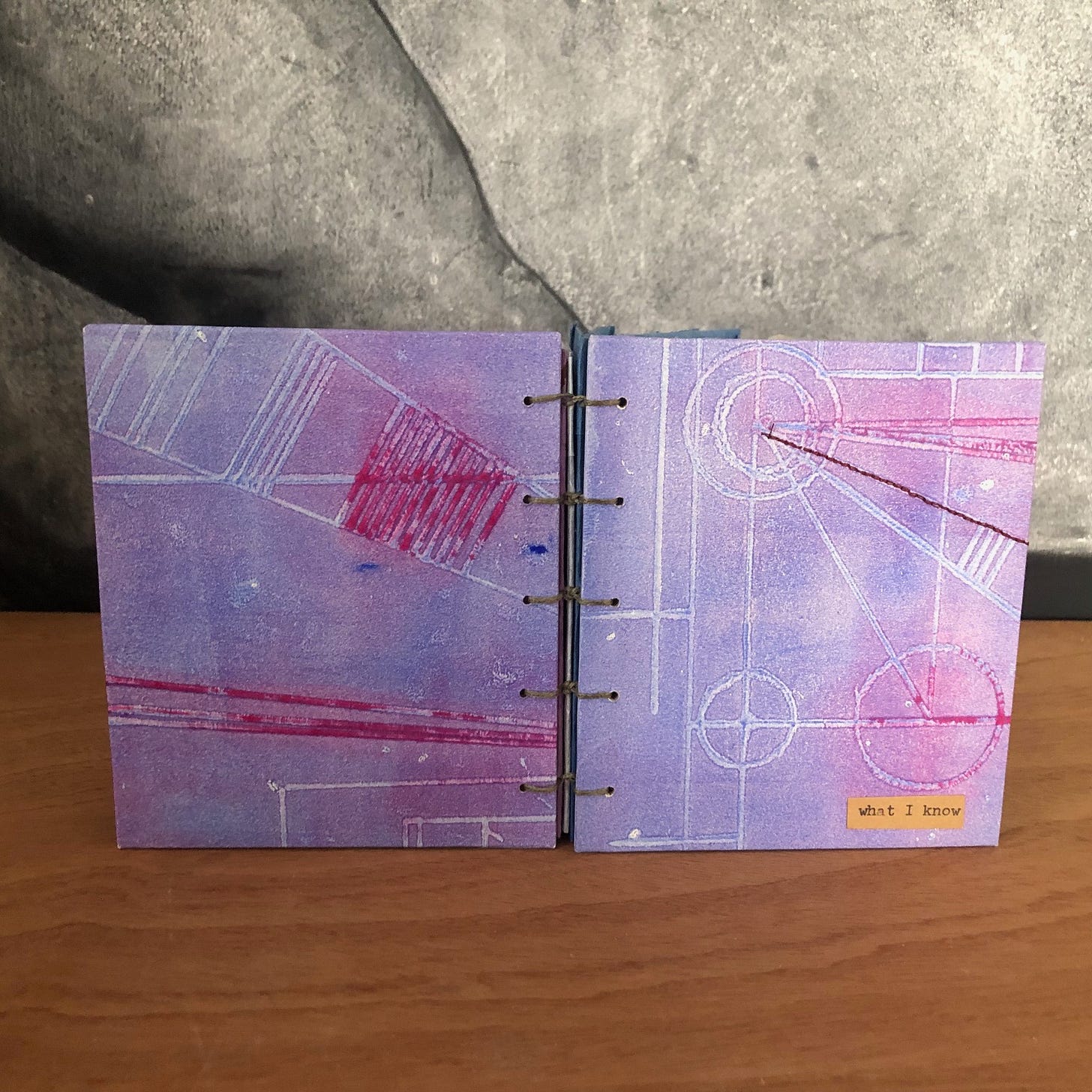
I was teaching only a handful of students by then, one or two each semester, mostly over Zoom. I was building the syllabi around their purpose and predilections, their please. I was reading the books they loved and whispering books their way, doling out prompts and possibilities over lectures selected with their hearts and heads in mind. I was Track Changing their words in the dark, before the sun. I was tracking my moods, perpetually aware of my growing love for these bright and beautiful souls.
We were breaking forms, shrugging off taboos, getting lost in the what how why. Sidewalks. Monster Portraits. Ghost Dance. Flights. Exploding Head. Autoportrait. Voice of the Fish. Her 37th Year. All Souls. 300 Arguments. We were arranging the books in any order we wished—dwelling on some, casting others aside. And so it came to a particular afternoon—my sun coming in through a side window, glancing off my screen, off of them, off of me. I’m not sure how it happened because it happened fast, but one of my students said, and then said again, that all of writing is a form of revenge, and I don’t know, but
something snapped,
though being teacherly, I said:
Please. I am listening. Explain. —
And my student did—my insanely talented student repeated herself: All of writing is a form of revenge. All of writing is an author taking aim. All of writing (this is how I now explained her statement to myself) arises from the enflamed need to have the final, triumphant word.
I was looking at her through the screen. I was remembering, as she spoke, the writers I have loved, the writers with whom I have never associated revenge: Marilynne Robinson. Colum McCann. Michael Ondaatje. Alice McDermott. William Maxwell. Hua Hsu. Ocean Vuong. Eudora Welty. Claire Keegan. Per Petterson. Wallace Stegner. Saskia Hamilton. Terrence des Pres. Doireann Ní Ghríofa. Carolyn Forché. So many and so many more. It was the
every
that had thrown me. The every single book an act of revenge. My heart was pounding, a messed-up gallop. My mind was a muddy trench. My face was on vivid Zoom display. I gathered up my dignity. Began
to declare
to defend
the books I’ve loved, the gorgeous all souls of them, the diaphanous ghosts in their patterns of dance. Where was the revenge in their sort and their spill? I asked. Where was the revenge in their wanting to know? Where was the revenge in their suggested question marks? Where was—?
Though of course, to be fair, I conceded that there have been many books (so many books) that one might argue (though one can not always know) had been sparked into existence by a desire for retribution. The author as take that. The author as there is but one story that counts, and that is the one I’m telling. The author as transcendence holds no interest for me and neither does forgiveness.
Though to be fair (again), I said, there are some things that simply cannot be transcended. There are some things that—well, who could actually forgive them?
(There are things I can’t forgive. There are moments and people in time, in this precarious right now. There are.)
I had talked myself into a circle. I had failed to shift my student’s point of view. All books, she repeated, smiling her beautiful smile. To which I might have said, had I been thinking straight and not in circles: Might we seek to be the exception to your rule? Might we marshal the tools we’ll need—empathy, nuance, perspective, objective truth, tonal depth, considered diction, even thematic suspense—and write away from revenge? There is evil in this world, and it should be accounted for, addressed. There are unforgivable acts; no one can insist upon forgiveness. But if we build our stories with every relevant tool available to us, we will gain our readers’ trust. If we write toward complexity, we will trust ourselves. If we summon the best in us, we will not wear the cloak of revenge.




Your student has the confidence and fire to make a bold assertion that takes you by surprise and requires your considered response. This is rare and admirable in a young writer, especially a woman. Perhaps (I hope) her position will moderate over time. Jeanette Winterson says in her memoir of a mother’s war on her spirit, “I cannot remember a time when I was not setting my version of the story against hers” (I’m paraphrasing from memory). You could call this memoir an act of revenge, but I doubt if this description applies to all of Winterson’s work. In a mature writer, I look for nuance. I think most mature readers do. Winterson’s “revenge” memoir is also a tribute to reading, which saved her. I didn’t intend to go on and on, but the proposition is so interesting.
Provocative. I might agree with your student in the sense of why are we even writing the book if one part of us isn't inherently thinking, I want them all to listen to ME. But I have to ponder a bit more.